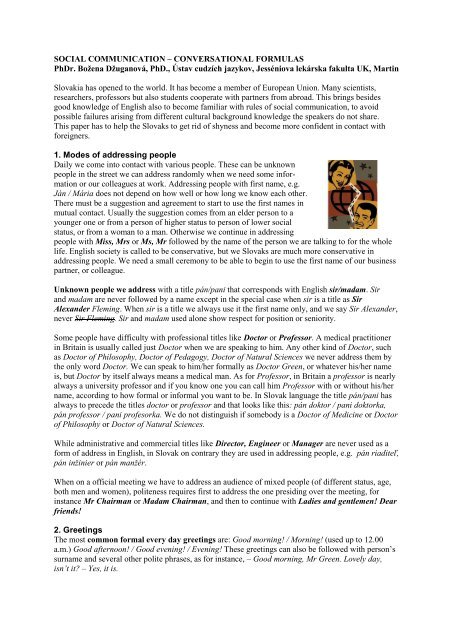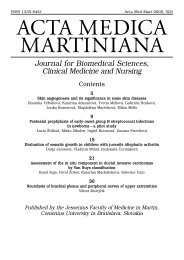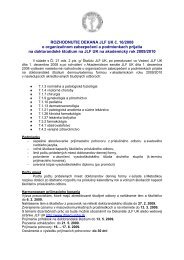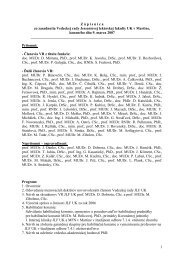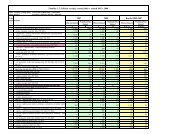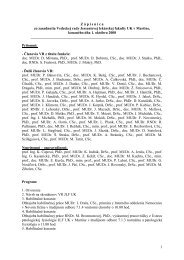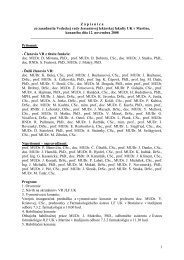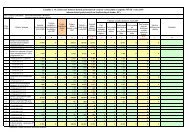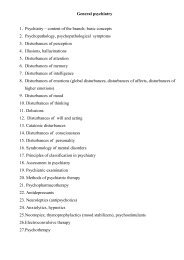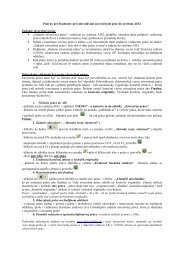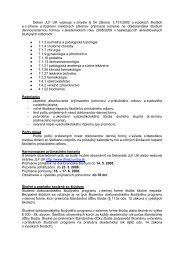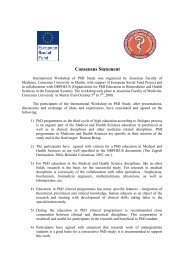CONVERSATIONAL FORMULAS - Jesseniova lekárska fakulta
CONVERSATIONAL FORMULAS - Jesseniova lekárska fakulta
CONVERSATIONAL FORMULAS - Jesseniova lekárska fakulta
You also want an ePaper? Increase the reach of your titles
YUMPU automatically turns print PDFs into web optimized ePapers that Google loves.
SOCIAL COMMUNICATION – <strong>CONVERSATIONAL</strong> <strong>FORMULAS</strong><br />
PhDr. Božena Džuganová, PhD., Ústav cudzích jazykov, Jesséniova <strong>lekárska</strong> <strong>fakulta</strong> UK, Martin<br />
Slovakia has opened to the world. It has become a member of European Union. Many scientists,<br />
researchers, professors but also students cooperate with partners from abroad. This brings besides<br />
good knowledge of English also to become familiar with rules of social communication, to avoid<br />
possible failures arising from different cultural background knowledge the speakers do not share.<br />
This paper has to help the Slovaks to get rid of shyness and become more confident in contact with<br />
foreigners.<br />
1. Modes of addressing people<br />
Daily we come into contact with various people. These can be unknown<br />
people in the street we can address randomly when we need some information<br />
or our colleagues at work. Addressing people with first name, e.g.<br />
Ján / Mária does not depend on how well or how long we know each other.<br />
There must be a suggestion and agreement to start to use the first names in<br />
mutual contact. Usually the suggestion comes from an elder person to a<br />
younger one or from a person of higher status to person of lower social<br />
status, or from a woman to a man. Otherwise we continue in addressing<br />
people with Miss, Mrs or Ms, Mr followed by the name of the person we are talking to for the whole<br />
life. English society is called to be conservative, but we Slovaks are much more conservative in<br />
addressing people. We need a small ceremony to be able to begin to use the first name of our business<br />
partner, or colleague.<br />
Unknown people we address with a title pán/pani that corresponds with English sir/madam. Sir<br />
and madam are never followed by a name except in the special case when sir is a title as Sir<br />
Alexander Fleming. When sir is a title we always use it the first name only, and we say Sir Alexander,<br />
never Sir Fleming. Sir and madam used alone show respect for position or seniority.<br />
Some people have difficulty with professional titles like Doctor or Professor. A medical practitioner<br />
in Britain is usually called just Doctor when we are speaking to him. Any other kind of Doctor, such<br />
as Doctor of Philosophy, Doctor of Pedagogy, Doctor of Natural Sciences we never address them by<br />
the only word Doctor. We can speak to him/her formally as Doctor Green, or whatever his/her name<br />
is, but Doctor by itself always means a medical man. As for Professor, in Britain a professor is nearly<br />
always a university professor and if you know one you can call him Professor with or without his/her<br />
name, according to how formal or informal you want to be. In Slovak language the title pán/pani has<br />
always to precede the titles doctor or professor and that looks like this: pán doktor / pani doktorka,<br />
pán professor / pani profesorka. We do not distinguish if somebody is a Doctor of Medicine or Doctor<br />
of Philosophy or Doctor of Natural Sciences.<br />
While administrative and commercial titles like Director, Engineer or Manager are never used as a<br />
form of address in English, in Slovak on contrary they are used in addressing people, e.g. pán riaditeľ,<br />
pán inžinier or pán manžér.<br />
When on a official meeting we have to address an audience of mixed people (of different status, age,<br />
both men and women), politeness requires first to address the one presiding over the meeting, for<br />
instance Mr Chairman or Madam Chairman, and then to continue with Ladies and gentlemen! Dear<br />
friends!<br />
2. Greetings<br />
The most common formal every day greetings are: Good morning! / Morning! (used up to 12.00<br />
a.m.) Good afternoon! / Good evening! / Evening! These greetings can also be followed with person’s<br />
surname and several other polite phrases, as for instance, – Good morning, Mr Green. Lovely day,<br />
isn’t it? – Yes, it is.
Words of greeting if addressed to some acquaintances are often followed by such expressions as:<br />
I haven’t seen you quite a long time. / Haven’t seen you for ages! / It’s good to see you again! /<br />
How nice to see you again! / I’m glad we’ve met. / How are you?<br />
Hallo is used in an informal way, sometimes followed by the person’s name, e.g.<br />
Hallo, Peter! (I’m) Delighted to see you.<br />
3. Words of parting<br />
Good-bye! /Good-bye for the present! In reply to these formulas of parting the same formulas are used<br />
respectively or no reply is done at all. E.g. “Well, I’m off. Good-bye.” – “Good-bye.”<br />
Bye-bye is really a child’s way to say good-bye. Also used when speaking to friends, it is pronounced<br />
very quickly and has become very common and can be said to anyone.<br />
See you soon! / See you later! / See you tomorrow! are neutral words or parting and can be followed<br />
with other phrases such as: I hope we’ll see some more of you!<br />
Good night! is not only used when going to bed, but also as words of parting late in the evening.<br />
Cheerio is a very informal way of parting and can be used only speaking to intimate friends. So long<br />
sounds as familiar as cheerio.<br />
After parting words we often let other people to be remembered by us, e.g.<br />
Remember me to …. / Give my (kind) regards to …. / Give my love to ….<br />
In reply to these formulas we say Thanks, I will. or Certainly I will.<br />
4. Introducing people<br />
Formal ways of introducing people are: May I introduce Mr N.? / Allow me<br />
to introduce Mr Green to you. / Allow me to introduce you to my friend. /<br />
Let me introduce myself, I’m … / Please, introduce me to your friend. / Will<br />
you introduce me to your friend, please? or Will you, please, introduce me<br />
to your friend. / Mr Green, let me introduce Mr Black. Mr Black. Mr.<br />
Green.<br />
Informal ways are:<br />
Meet my friend Doctor M. / Meet Mr. F ./ I’d like you to meet Doctor Green.<br />
Mrs H., this is Mr P. is unpretentious and yet formal enough for any occasion.<br />
Possible replies are:<br />
How do you do? said by both of introduced persons.<br />
Hallo! / Glad to meet you. / Pleased to meet you.<br />
5. Arresting someone’s attention<br />
Phrases like Excuse me, (please). / Pardon me. / Sorry to … (intrude, interrupt, interfere, etc) but …<br />
are used when we want to attract the attention of a stranger, an elderly person, or a person of higher<br />
rank or position.<br />
Hi!/Hey! are commonly used among friends, young people and children. They are more widely used<br />
in the USA than in Great Britain.<br />
Possible replies: Yes? / Well? / What is it? / What can I do for you? / What do you want?<br />
6. Congratulations and wishes<br />
When your foreign friend has graduated from university, fulfilled doctoral<br />
studies, obtained higher rank or social status, was successful in some<br />
competition, we can congratulate him/her as follows: Congratulations! / My best<br />
congratulations to you on graduation from the university. / My best wishes to<br />
you! / May all your dreams come true! / (I wish you) Good luck !<br />
These are the most general expression used on any occasion but Christmas, the New Year and other<br />
holidays, when we wish Merry Christmas and a Happy New Year! and as an answer repeat the same.
If somebody is leaving for holiday, so we wish him/her, e.g. Have a good time! Enjoy your holiday!<br />
A very enjoyable holiday to you!<br />
If somebody is celebrating his/her birthday, we wish him/her Happy birthday (to you)! Or Many<br />
happy returns of the day. The answer is Thank you, Thank you very much or Thanks.<br />
7. Invitations, arrangements, offers<br />
If you want to invite somebody for a cup of coffee or tea, for a lunch, you can do it in the<br />
following way: What about a cup of coffee? / How about having some tea? / What about having a<br />
lunch?<br />
If you want to invite your friend to the cinema or theatre, or to spend a weekend together, you<br />
can do it in the following way, e.g. Have you got anything special on Tuesday? / What are your plans<br />
for Tuesday evening? / May I invite you to the cinema/theatre? / Will that suit you? / Will it be all<br />
right for you?<br />
Some of the positive replies to invitations and offers are: All right. / With pleasure. / Yes, I don’t<br />
mind. / That’s fine. / That’s a good idea. / Not a bad idea./ Yes, I’d love to go to … / I’ll be most<br />
delighted. / Nothing would please me more. / That suits me perfectly.<br />
Some of the negative replies to invitations of offers are: I’m afraid I can’t. / I’m afraid I’m busy. /<br />
I’m sorry, but I can’t.<br />
8. Requests and thanks<br />
Sometimes we have to ask other people for help. This can be done in the following way: Will you<br />
help?/Would you please help me? / Would you mind lending me your dictionary? / Do you mind<br />
lending me your textbook? / May I ask you to … ?/ Could I trouble you to…?<br />
Possible positive replies: Yes, certainly. / Of course. / Sure / Not at all. / Not in the least! / With<br />
pleasure! / You can rely on me.<br />
Possible negative replies: I’m afraid I can’t. / I am sorry I can’t.<br />
For provided help we can thank in one of the following ways: Thank you (very much) for your help.<br />
/ Many thanks. / Thanks a lot. / That’s very kind of you. / You’ve done me a great favour. / Thank you<br />
for the pleasure.<br />
Possible replies: Not at all! / That’s all right! / Don’t mention it! / That’s really nothing! / It was a<br />
pleasure for me to do it.<br />
References<br />
Maher, J.C. (1990): International Medical Communication in English. Oxford University<br />
Press.<br />
Mothejzíková, J. (1991): Functions for Oral Interaction. A Course in Conversational English<br />
for Upper-Intermediate and More Advanced Students. SPN Praha.<br />
Serafimova, M. A. et al. (1974): Conversational Formulas. Izdateľstvo Prosveščenie, Leningrad.<br />
Ilustračné obrázky: http://office.microsoft.com/sk-sk/images


